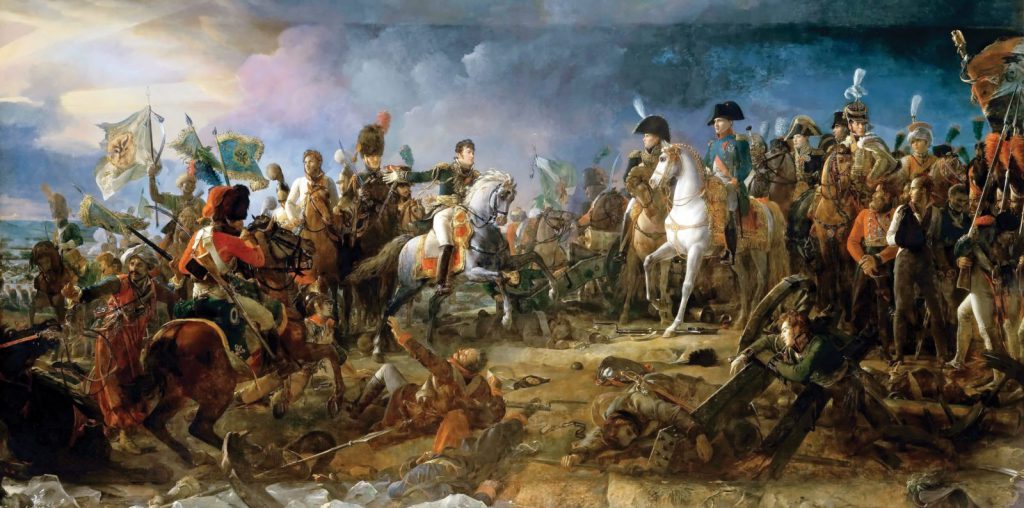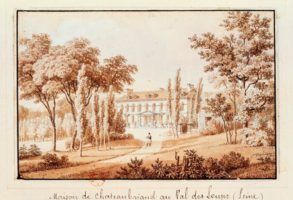
Published November 15, 2018
Napoleon
A Life
by Adam Zamoyski
Basic, 764 pp., $40
Men of action present a problem for decent modern democrats. For the very term “men of action” is a euphemism for men accomplished in war, and no public figure is more suspect these days than the warlike man. When Winston Churchill called Napoleon Bonaparte (1769-1821) “the greatest man of action born in Europe since Julius Caesar,” he meant to praise Napoleon in the highest terms, but for many, such praise is fraught with peril. After all, Julius Caesar, named dictator in perpetuity, placed the Roman Republic in mortal danger and died a tyrant’s death; the most famous of his assassins, Marcus Junius Brutus, is remembered as a paragon of republican virtue, though it proved impossible to restore the Republic after Caesar’s day.
Napoleon for his part extinguished all hope of a French republic by prudently measured gradations. Having won public adulation by heroic feats of generalship in Italy and Egypt, he knocked over the ruling Directory in the bloodless coup of 18 Brumaire in 1799 and as First Consul commanded power greater than that wielded by Louis XIV; he did what dictators often do and designated himself consul for life in 1802; then he took the obvious next step for a hero-worshipper of Julius Caesar and Alexander the Great and crowned himself emperor in 1804. And like Caesar and Alexander he ended badly, abdicating the throne in 1814 after disastrous military defeats, forced into exile on the Mediterranean islet of Elba, reclaiming imperial power a year later, only to meet decisive calamity at Waterloo and be condemned to the South Atlantic island fastness of Saint Helena, from which the sole escape was death, a mercy when at last it came, in 1821.
To some it might seem only natural to compare Napoleon to Churchill, who was the greatest man of action since Napoleon, though not as a commander in the field. But a less attractive comparison has worked its way into historiographic orthodoxy since the Second World War, and it sees Napoleon “as a kind of proto-Hitler whose secret police, press censorship, aggressive foreign policy and desire for a new European order all presaged the horrors unleashed by the Nazis,” as Andrew Roberts writes in his masterly 2014 biography. Roberts finds this comparison as wrong as can be, and he does a manful job of rehabilitating Napoleon, without succumbing to abject devotion. Napoleon’s latest biographer, Adam Zamoyski, though not as inclined to encomium as Roberts, manages to do justice both to Napoleon’s achievements without flattery and to his grave flaws without invocations of totalitarian oppression or genocidal mania.
It may be tempting to portray Napoleon as a monster, whose war-making stained the killing fields of Europe, North Africa, and the Levant with the blood of some five million men. Zamoyski prefers to paint Napoleon as “the embodiment of his epoch,” which saw democracy emerge in a hard and bloody birth and the old regime attempt to snuff it out before it had the chance to draw a breath.
In the 1790s Napoleon entered a world at war, and one in which the very basis of human society was being questioned. It was a struggle for supremacy and survival in which every state on the Continent acted out of self-interest, breaking treaties and betraying allies shamelessly. Monarchs, statesmen, and commanders on all sides displayed similar levels of fearful aggression, greed, callousness, and brutality.
All nations were culpable, none was better than the rest, and one must simply accept that political men driven by “the lust for power” will engage in enormity without a second thought. Napoleon was not uniquely wicked, perhaps not wicked at all; in Zamoyski’s eyes to parcel out good and evil is mere cant when discussing power politics.
Anyway, Napoleon was just a lieutenant when war broke out in 1792, so he cannot be held responsible for the general conflagration. Nor was he more bloody-minded than his predecessors in power. “French losses in the seven years of revolutionary government (1792-99) are estimated at four to five hundred thousand; those during the fifteen years of Napoleon’s rule are estimated at just under twice as high, at eight to nine hundred thousand.” Of course Zamoyski does not number here the four million enemy dead in the Napoleonic wars; for those the rulers who sent them into battle must evidently be held responsible, if one wishes to speak of responsibility at all.
For what ultimate purpose then did Napoleon devote his life to war, and for what were millions of Frenchmen so eager to kill and die? The ethos of the French Revolution exalted the warrior who fought for his country’s honor, and his own, to the pinnacle of human greatness. The erosion of Christian belief effected by the Enlightenment cult of reason had made eternal life seem a serious unlikelihood, not to say an impossibility; but one could still make oneself deathless after a fashion by feats of arms for France. For the French nation there was nothing one couldn’t do.
It was Man, not God, who was central to the new value system, and his collective identity, the Nation or “ patrie,” became the object of worship. Henri Beyle, to become famous as the novelist Stendhal, was thirteen when Bonaparte took command of the Army of Italy and recalled that for his generation “our only religion was [. . .] to be of service to the patrie.”
Of course there was something more in it for the individual fighting man. What drove the Frenchmen of this age was the yearning for glory, earned in the service of the nation, in the face of imminent violent death. Such renown was the closest thing available to real immortality. La gloire roused the French heart like nothing else. Zamoyski quotes Germaine de Staël on this consummate passion: “It is, without doubt, an intoxicating sensation to fill the universe with one’s name, to go so far beyond the bounds of one’s being that it becomes possible to delude oneself as to the limits and extent of one’s life, and to believe that one possesses some of the metaphysical attributes of infinity.” In Zamoyski’s cascade of praise for the “seemingly superhuman surge of energy” that glory inspires, one easily loses sight of Madame de Staël’s caveat: Glory can be a fatal delusion. And no man craved glory as Napoleon did, ravished by the lives of noble Greeks and Romans as recounted by Plutarch and avid to join that peerless company.
Yet violent death en masse has a pungent reality that the bubble reputation cannot equal. There are things worth killing and dying for, but for a truly serious man glory does not come high on the list. To treat war as a noble escapade is to misunderstand one’s humanity. True understanding is hard-won.
Many observers of the [Italian] campaign of 1796 commented on the almost festive spirit in which these men appeared to banter with death, singing on the march and laughing as they went into battle. “We were all very young,” recalled [Auguste de] Marmont, and “devoured by love of glory.”
Twelve years later, when he was an imperial marshal, the highest rank in Napoleon’s army but for the emperor himself, Marmont would be profoundly disabused of that youthful enthusiasm. Of the Battle of Wagram against the Austrians, which Zamoyski calls “the largest and longest-lasting battle Napoleon had fought,” Marmont would remark that the terrible shambles was “a victory without consequence.” Thousands died pointlessly. “The days when swarms of prisoners would fall into our hands, as in Italy, at Ulm, at Austerlitz, at Jena, were past.”
The enemy was more likely to fight to the death than in those palmy early victories, because now Napoleon was feared and hated. During the Wagram campaign, Napoleon sharply inquired of General Mathieu Dumas, veteran of the American Revolution as well as the French, whether he was “one of those idiots who still believed in liberty.” When Dumas confessed that he was, Napoleon assured him that in fact like everyone else he was merely the instrument of his own ambition: Every lieutenant wanted to be a general, every general a marshal, every marshal a prince. For these honors they all were ready to die on the spot. Napoleon now embodied the malign cynicism of the power hungry. As Zamoyski writes, “From having been widely viewed as a liberator and a friend of the oppressed, he was now coming to be seen as the oppressor.”
The arrogance and greed of the new masters of Europe undercut the manifest benefit they brought.
There was an inherent contradiction at the heart of the whole Napoleonic imperium: its mission was to enlighten, liberate, and modernize. Feudalism was swept away, along with all disabilities imposed by guilds and corporations, Jews were liberated, and all forms of servitude abolished, yet new hierarchies were created and political constraints imposed on the economy. Since most of the inhabitants of the Continent recognised only monarchy as a principle of government, Napoleon abandoned republican models in favor of imperial and royal ones, with all their trappings of titles, honors, decorations, and courts.
In an era of rising egalitarian sentiment, the defeated peoples felt their conquest more passionately than they enjoyed their liberation, as the new regime came to resemble the old one more and more. And Zamoyski is simply wrong to say that Napoleon established imperial institutions and mores because those were all the conquered nations understood: He established imperial rule because he ruled as emperor.
For all his military and political genius, for all the pomp and splendor of his reign, Napoleon as Zamoyski presents him is afflicted with what George Eliot called “spots of commonness.” One sees him as a fool in love, a newlywed cuckolded by his first wife, Joséphine; as a serial adulterer himself and perhaps even a rapist; as a pituitary case with a gross paunch and shrunken genitalia; as a loser sunk in dejection after his 1812 Russian fiasco, sulking at dinner and snapping at his (second) wife; as a bored and restive exile on Elba habitually cheating at cards, for which only his mother had the temerity to call him out; and as a writhing mass of pathologies after Waterloo, floundering haplessly when he might have had a chance to gather his forces for a counterblow if he had kept his nerve: “But Napoleon was in a state of shock. ‘What a disaster!’ he had exclaimed to Davout. ‘Oh! My God!’ he cried out with ‘an epileptic laugh’ as he greeted Lavalette.”
Good democrats like their great men cut down to size. Hegel, who had seen Napoleon triumphant at Jena and marveled at the spectacle, writes in The Philosophy of History that any schoolmaster can suppose himself a better man than Julius Caesar or Alexander the Great because he has never indulged the immoral craving for conquest and its attendant world-historical fame, but “enjoys life and allows other to enjoy it too. These psychologists are particularly fond of contemplating those peculiarities that belong to great historical figures as private persons.”
Hegel goes on to cite the proverb that no man is a hero to his valet, and he gives himself credit for having added that this is not because the hero is no hero but rather because the valet is a valet. “Historical personages fare badly in historical literature when served by such psychological valets. These attendants degrade them to their own level, or rather a few degrees below the level of their own morality, these exquisite discerners of spirits.”
Every serious modern biographer has some of the valet about him, and that is a good thing. One may be grateful that it is not some Hegelian epigone writing Napoleon’s life today. Adam Zamoyski has written an honest account of a remarkable man who lived for glory and fell into ignominy. There is no suggestion that Napoleon was the prototype for Hitler. Simply being Napoleon was wickedness enough.
Algis Valiunas is a fellow at the Ethics and Public Policy Center and a contributing editor at the New Atlantis.




